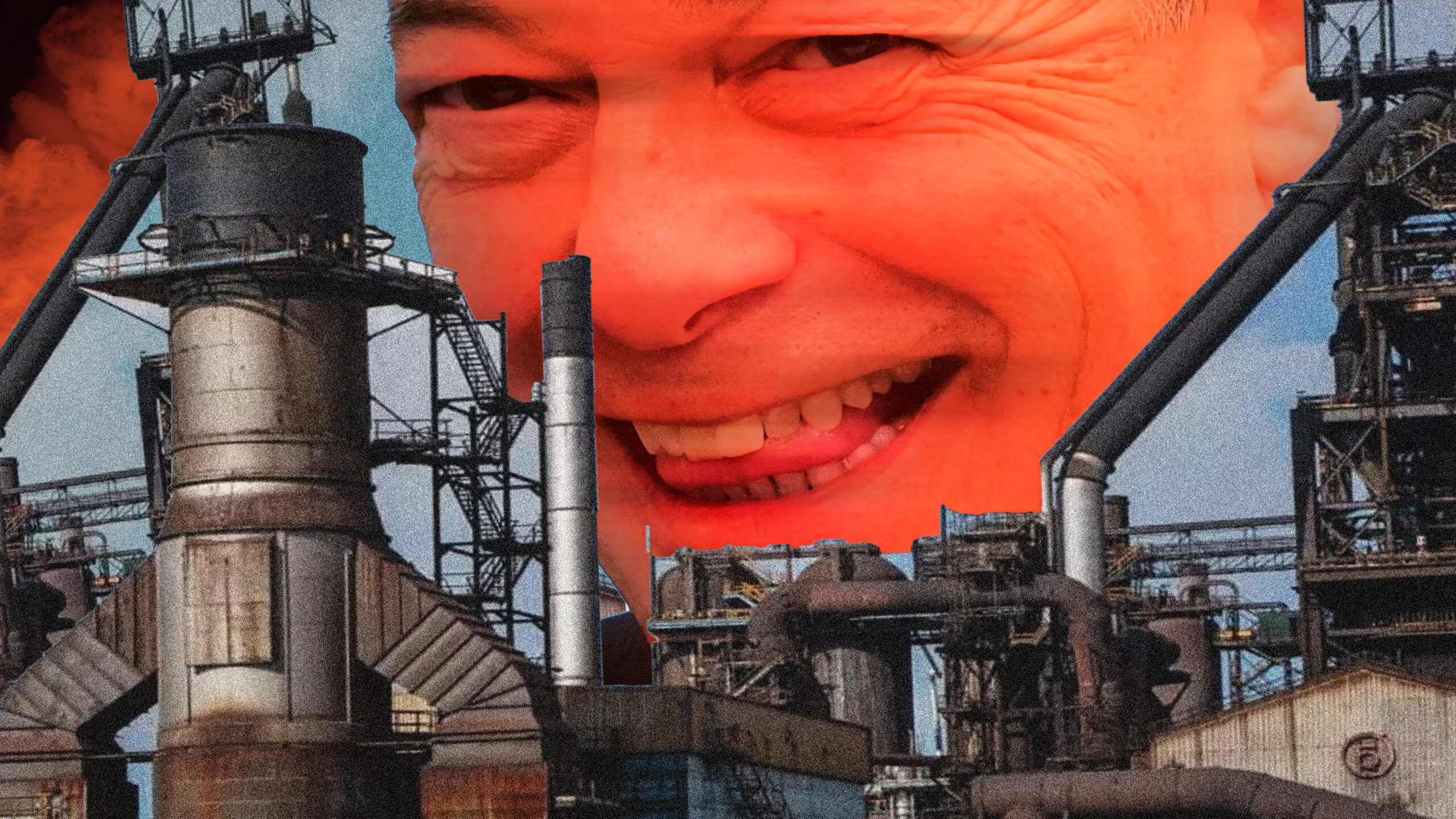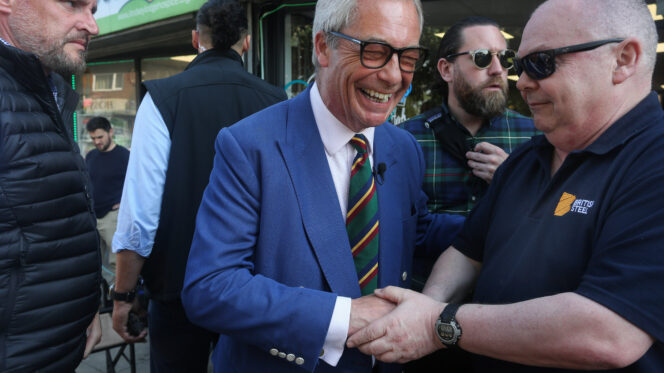Trade Unions Left a Political Vacuum. Now They’re Playing Catch-Up to Fight Off Reform

Paywalls? Never. We think quality journalism should be free for everyone – and our supporters make that possible. Chip in today and help build people-powered media that everyone can access.
“I worked for 22 years in the metals industry,” said Nigel Farage in April, commenting on the under-threat steelworks in Scunthorpe. “I’ve watched many of the firms that I used to deal with close or disappear.”
That the Reform leader watched those disappearances from his desk as a metals trader in the city hasn’t stopped him making his former career his justification for turning up at British Steel’s flagship site to call for nationalisation of the steelmaker.
In a photo stunt ahead of the Greater Lincolnshire mayoral election on 1 May, Farage, deputy party leader Richard Tice and former Tory turned Reform candidate Andrea Jenkyns brandished union posters saying “Save our steel”. Trade union Community pointed out that the posters were five years out of date and added: “Labour is working with unions and workers to secure the best outcome for Scunthorpe.”
It was an exchange which seemed to sum up the challenge trade unions face from Reform: Farage is a blatant opportunist, and yet it’s his pro-business party that is tapping into the anti-establishment mood of workers across the country.
It may be that Reform’s pitch has so far failed to land with union leaders. But that’s unlikely to faze Farage, whose message is intended instead for their members. “As the party of working people,” he wrote in the Daily Mail earlier this month, “we are ready to be a friend to the unions”.
The party’s sudden shift goes beyond Scunthorpe. Reform’s 2024 Welsh conference took place in Port Talbot, home to the now shuttered steelworks. Farage has avoided making direct criticism of the Birmingham bin strikers, has stoked anxiety over uncertainty caused by a green transition – a major concern of the GMB and Unite who have members in energy and manufacturing – and has advocated for the reindustrialisation of Britain. Last month, Tice, a property millionaire, “proudly” donned a trade union pin badge in the House of Commons.
It’s too soon to say if Reform’s courting of union members will produce the desired electoral effect, although both Unite and the Communication Workers Union have already warned that members are responding to the party’s messaging.
Despite the near universal endorsement of Labour by union leaders at last year’s election, union membership does not guarantee a leftwing or Labour vote. Amidst the surprise at Reform’s pivot to union voters, it’s important to remember that the demographic of industrial union members the party is courting overlaps heavily with the demographic of voters who have long been drifting away from the Labour party.
At the same time, organised labour is diverse – there are more female trade union members than men and the proportion of employees who are trade union members is highest among Black workers – and not all have goals that align with Reform’s proclaimed objectives.
For public-sector unions that represent local government workers, the threat to members from Reform has already become real: ten local authorities – including Durham, a once Labour stronghold and home to the annual Miners’ Gala – and three mayoralties went to the party at the May elections.
At the party’s election launch in March, Farage spoke of his plans for a “British form of Doge” – referring to Elon Musk’s so-called budget-cutting “department of government efficiency” – in every council, and has told council officials working on climate change and diversity to look for new jobs.
Unions in the health and service sectors, whose members are more likely to be migrants, will likely be alarmed at the party’s racism, stance on immigration, and adoption of the British National Party’s old slogan “British jobs for British workers.”
Why does Farage want me to lose my job?
As some of their members are drawn to the party’s new-found pro-worker posture, the labour movement is deploying new and old tactics to stem the bleeding.
The Trades Union Congress (TUC) is campaigning on the areas it thinks Reform is weakest: Farage’s calls for a private insurance health system, his close relationship to Donald Trump, and the fact that its MPs voted against Labour’s employment rights bill. It is also in the process of hiring an organiser with a specific focus on countering the far right.
The night before May’s English local elections, the TUC posted a video on social media featuring a worker outside a Cheshire electric car plant asking: “Why does Nigel Farage want me to lose my job?” followed by a clip of Farage asking the audience whether they’d buy an electric car, to which they shout “no!”
TUC general secretary Paul Nowak has called Farage a “political fraud and hypocrite” who is “cosplaying” as a working-class champion. His criticisms have not been reserved solely for the Reform leader. After May’s local election results, Nowak warned Labour in the Mirror that it has “nothing to gain from trying to out Reform-Reform.”
But rejecting Farage’s overtures to union members is made harder by workers’ ambivalence and hostility towards Keir Starmer’s Labour party, to which they have an umbilical link.
The government has made changes that union leaders can credibly say benefit their members: rail nationalisation, the settling of public sector disputes, green investment, a boost to the national minimum and living wage, and Labour’s flagship employment rights bill. However, awareness of them has failed to cut through and they are yet to result in tangible improvements in members’ lives.
Instead, they are outweighed by what members do know of Labour: winter fuel allowance cuts, a refusal to scrap the two-child benefit, and planned cuts to disability benefits. When justifying the latter, Labour MPs often do so explicitly in the language of work: that forcing people into jobs makes sense as the “the clue is in the name, the Labour party”.
For union leaders, this means using the wins they’ve secured from Labour as a basis from which to attack Reform risks provoking further anger from members, many of whom see their unions as reflexively supportive of Labour, while failing to secure anything in return.
Farage is already seeking to drive a wedge between rank-and-file union members and union leaders. Following the party’s gains in the May election, Unison general secretary Christina McAnea told staff at Reform controlled councils to join a union to ensure that the party doesn’t “play fast and loose with the law.” To this, Farage shot back: “Instead of attacking us, they should try and understand why so many of their members are supporting us and joining as members.”
A political vacuum.
For Lewis Norton, a Unite organiser who has conducted research into far-right narratives amongst industrial members, the problem is that unions have shied away from political battles. “Reform is stepping into a vacuum, into a space that was once occupied by the left,” he said. When union membership fees increased recently, he heard reports of members saying “I’d rather keep my Reform membership than my trade union membership”.
That’s why he thinks a campaign approach centered on Reform’s dishonesty – that an acolyte of Thatcher would never champion labour – is limited. “The idea that Reform are just lying to you, that they’re fascist in carpet slippers, that stuff isn’t cutting through anymore, even though it’s all credible. Now our members are saying, ‘But Reform are the ones intervening. They’re the ones actually doing things.’”
“We can keep saying, ‘Look, Reform are liars, they’re wolves in sheep’s clothing.’ But that’s a lot stronger if then we can present a rival economic argument and say: ‘And this is what we’re going to do, this is what we’re going to push for.’”
It’s an opinion shared by Lee Hunter, who has been in the fire service for over 20 years and chairs the Fire Brigades Union North West region. That covers Runcorn and Helsby, where Reform overturned Labour’s 14,700-vote majority in the May by-election.
In the run-up to the election, Hunter and other operational firefighters took to the streets of the constituency to hand out leaflets reading “Reform are part of the establishment” to voters. Their message was simple: “We believe that Reform is going to harm our members and harm our communities.”
Where pedestrians failed to stop for groups like Stand Up to Racism, or other political parties canvassing, they stopped for Hunter. “What firefighters still have in our communities is a level of trust that a lot of other people who wear uniforms don’t have. You could literally see barriers coming down,” he said.
For Hunter, the basis of Reform’s approach is “pointing the finger at minority groups and saying, ‘you need to be scared of them.’”
“This is an age-old political stunt, just trying to create common enemies.”
Reform’s task has been made easier by what he sees as the union movements retreat from the defence of broader working-class solidarity.
“We’ve seen unions become much more insular and try to look after the needs and the wants of their members,” said Hunter. “They fight for pay, and for terms and conditions. That is all perfectly valid.”
But in doing so, unions have abandoned making a broader political argument. “If you are not going to look at those who are in power,” said Hunter, “then it’s a constant losing battle”.
Shrinking membership has seen unions retreat onto narrower terrain, defending their own interests. This, combined with a more conciliatory partnership approach to employers, has allowed Reform to credibly reframe the common enemy away from an “us” and “them” of “workers” versus “bosses” to a “them” that encompasses migrant workers, transgender people, and a nebulous set of elites.
Reform’s approach was devastatingly effective at the local elections. “We’ve now got parts of Lancashire under a Reform council,” said Hunter. “We have got some very real concerns on what that’s going to mean for the future of Lancashire Fire and Rescue Service.”
The absence of a rival economic argument is most acute over what Tice terms “net stupid zero,” which Farage has argued is causing deindustrialisation. Despite Labour’s climate pledge of £15bn, and the introduction of Great British Energy, the party’s stance on the green transition is muted, muddled, and bringing it into conflict with trade unions.
Last month, as Grangemouth oil refinery ceased operations, Unite general secretary Sharon Graham warned Starmer: “The government needs to stop the talking and begin investing in Britain and green industries. If they don’t, no one should be surprised when workers vote with their feet.”
Net zero – which Farage has described as the next Brexit – formed the basis for much of Trump’s attack on the Democrats at last year’s election. When the United Automobile Workers went on strike in 2023, Trump said: “You can be loyal to American labour, or you can be loyal to the environmental lunatics. But you can’t really be loyal to both. It’s one or the other.”
The union was quick to point out that he delivered this message, aimed at union members, at a non-union business. But, much like Community’s accusations over Reform’s out-of-date Save Our Steel posters, messages like these are less about speaking directly to workers, and more about the political opening that being seen to speak to workers provides.
Hunter recalled a conversation with a member in Merseyside: “He informed me that he was going to vote Reform, and I asked why. He said, ‘Because we need change.’ I said, ‘What change is Reform offering?’ And he went, ‘They’re offering change.’ I said, ‘But what change?’ And he couldn’t give me an answer.”
Polly Smythe is Novara Media’s labour movement correspondent.


